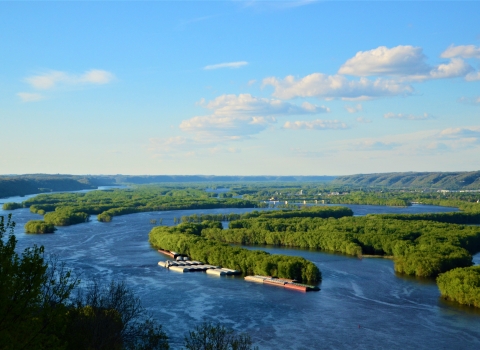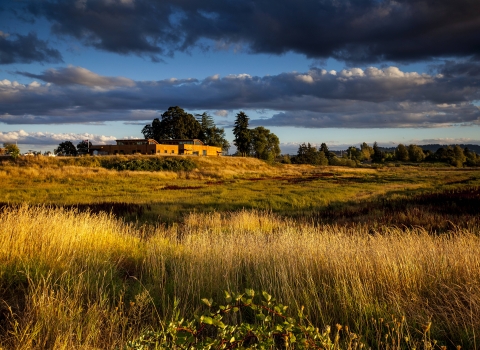The U.S. Fish and Wildlife Service (the “Service”), the National Oceanic and Atmospheric Administration, and the New Jersey Department of Environmental Protection, (the “Trustees”), have opened a 30-day public comment period on the Draft Floodplain, Riparian, and Wetlands Restoration Plan/Environmental Assessment (RP/EA) for proposed ecological restoration associated with the American Cyanamid Superfund Site in Bridgewater Township, Somerset County, New Jersey (the “American Cyanamid site”). The Trustees have identified restoration actions that could compensate the public for potential injuries resulting from the release of hazardous substances at the American Cyanamid site. Federal agencies are required to develop an EA as part of the process for determining whether a proposed action has the potential to cause significant adverse environmental impacts. The RP/EA will be available for comment through June 22, 2023.
Releases associated with industrial activities at the American Cyanamid site resulted in contamination of soil and groundwater with volatile organic compounds, semi-volatile organic compounds, polychlorinated biphenyls, polycyclic aromatic hydrocarbons, cyanide, and heavy metals. Releases to the Raritan River and Cuckels Brook, a tributary to the Raritan River, as well as associated sediments, groundwater, wetlands, riparian riparian
Definition of riparian habitat or riparian areas.
Learn more about riparian areas, floodplains, and uplands have resulted in potential injury to fish and wildlife.
The Trustees seek to compensate the public for potential injuries to floodplain, riparian, and wetland resources that occurred as a result of the release of hazardous substances at the American Cyanamid site. The preferred restoration alternative is a proposed commitment by a potentially responsible party (PRP) at the American Cyanamid site to fund and implement the design, construction, and 15-year maintenance of a 112-acre floodplain reforestation project adjacent to the Raritan River on property owned and managed by the Duke Farms Foundation in Hillsborough, New Jersey.
“The proposed forested floodplain restoration will create and enhance habitats for migratory birds, as well as several federally listed bat species,” said Margaret Byrne, the Service’s Regional Coordinator for the Natural Resource Damage Assessment and Restoration Program. “The Fish and Wildlife Service celebrates the achievement of this cooperative settlement to address injuries from the American Cyanamid site."
The restoration would involve managing invasive species invasive species
An invasive species is any plant or animal that has spread or been introduced into a new area where they are, or could, cause harm to the environment, economy, or human, animal, or plant health. Their unwelcome presence can destroy ecosystems and cost millions of dollars.
Learn more about invasive species , creating vernal pools, planting approximately 50,000 native trees and shrubs, installing deer fence, and conducting long-term monitoring and maintenance to realize the following benefits for wildlife and people:
Improved habitat for a diversity of wildlife including migratory birds, amphibians, and mammals
Filtering nutrients and pollutants and reducing sedimentation to improve water quality
Restoring wetland function and hydrology to increase water-table capacity
Increasing water uptake from trees and shrubs to improve flood resilience
Increasing shading of the river to keep water temperatures cool for aquatic species
"Through this settlement, we continue to prioritize the protection and restoration of our natural resources and the health of communities impacted by contaminated sites." said Dave Bean, Manager of the New Jersey Department of Environmental Protection Office of Natural Resource Restoration, "The natural resource resolution of the American Cyanamid site marks another significant step forward in our ongoing efforts to remediate legacy pollution and safeguard public health and the environment for current and future generations."
"NOAA is proud to help bring floodplain forests and wetlands back to the Raritan River basin," said John Catena, supervisor for the NOAA Restoration Center's Northeast/Great Lakes region. "The new forest will have a wide spectrum of benefits, delivering stormwater protection and a clean natural resource for a community overburdened by flooding and pollution."
In 2017, an agreement resolved the PRP of potential liability related to in-river injury resulting from releases of hazardous substances from the American Cyanamid site. Upon successful completion of the proposed restoration, the Trustees will release the PRP from their remaining liability for Natural Resource Damages under the Comprehensive Environmental Response, Compensation and Liability Act (CERCLA) and the Natural Resource Damage Assessment regulations at the American Cyanamid site.
More information is available at https://www.fws.gov/project/floodplain-reforestation-project-proposed-along-raritan-river-hillsborough-new-jersey and the draft RP/EA can be accessed at the following website: https://www.cerc.usgs.gov/orda_docs/DocHandler.ashx?task=get&ID=9776. Comments will be received through June 22, 2023, and may be submitted electronically to Jillian_R_Stark@fws.gov or via mail to:
Jillian Stark
4 E. Jimmie Leeds Road, Suite 4
Galloway, NJ 08205
Please put “ATTN: 2023 American Cyanamid Draft RP/EA” in the subject line of comments.
New Jersey Field Office staff will be available to provide information and answer questions throughout the 30-day comment period. For more information, please contact Jillian_R_Stark@fws.gov.



